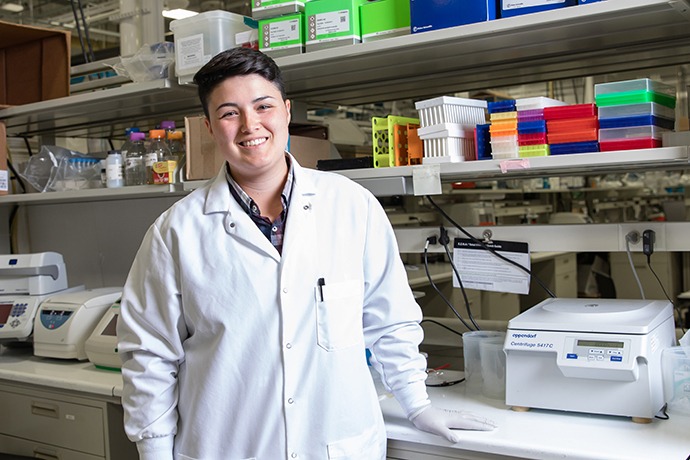Bethany Freel never considered research as a career option until one of her undergraduate professors encouraged her to come see the program at Sanford Research. The Missouri native seized the opportunity and immediately found her niche. She has been pursuing research ever since.
“I really discovered Sanford’s programs by chance,” explains Freel. “I knew I didn’t want to go to pharmacy or medical school, and one of my undergraduate professors asked me if I had thought about research. I remember responding, ‘Oh no, I am much too social for that.’ But he told me about the summer program and invited me to go with a group he was taking to check out the program.”
So then Freel and a group of students from Central Methodist University traveled to Sioux Falls to tour Sanford Research, meet with the researchers and discover more about the summer internship program.
Reaching out
“I never would have thought to study eight hours from home over the summer, but the experience opened so many doors and opportunities,” Freel says. “After I had completed my summer internship, I talked with Dr. Lance Lee, who is the director of higher education at Sanford Research, about going to graduate school for research. He mentioned that Sanford has a great graduate program with the University of South Dakota.”
While Freel applied to a few other programs, her heart was set on furthering her education with Sanford Research and USD. In the year she applied, USD accepted 12 students into the program, of which four were accepted for Sanford Research. Freel was one of those four.
“A lot of students think they have to attend a big undergraduate college to be accepted, but I graduated from a school with only 300-350 students. We didn’t have a big research budget. However, the school did an exceptional job of emphasizing thinking through the process and troubleshooting,” Freel says.
She adds: “At a small school, I got the one-on-one attention I needed to build academically. Then, I was able to translate that academic foundation to my work in graduate school.”
Making a connection
She began her studies in the Basic Biomedical Science Program at the Sanford School of Medicine at USD, dividing her time between classes and the laboratory at Sanford Research.
“You get to complete lab rotations in your first academic year. Rather than being in one laboratory, the program allows you to try multiple laboratories before picking your thesis laboratory,” Freel says. “That was very important and valuable for me. I rotated in three different laboratories that had nothing to do with one another.”
“As a first-year student, you really want some reassurance,” she adds. “I wanted to work in a laboratory where I already had a general understanding of the methods. Some laboratories do really advanced techniques, so I wouldn’t have felt as comfortable in my first year.”
Hence, the program provided her the support she needed to succeed. The open space allowed her to collaborate with the researchers, research staff and fellow graduate students.
“If I have to do an experiment and am unsure on something but I know so-and-so in a different laboratory excels at that technique,” Freel explains “I could go talk to that person. And that person would drop everything to help me.”
The program also emphasizes advancement professionally and personally. Dr. Lee ensures students have the opportunity to connect with different speakers, researchers and academics regularly. This helps students think outside the box on career opportunities and network with leaders in medicine.
“The biggest thing I have learned is that you don’t have to have the best grades, the best resume or CV (curriculum vitae),” Freel says. “You just have to reach out and make a connection. You have to be willing to put yourself out there. Even if 90 percent of people don’t respond to you, those ones who do could be the most helpful for your career.”
More stories
- Top grants help Sanford Research draw undergrad interns
- Sanford Research inspires grad student Hannah Wollenzien
- Anderson able to pursue two careers with Sanford Research
…
Posted In Children's, People & Culture, Postgraduate Programs, Research, Sanford Stories
